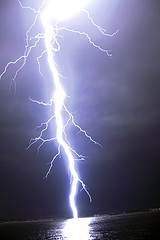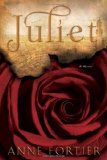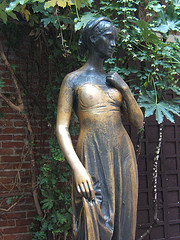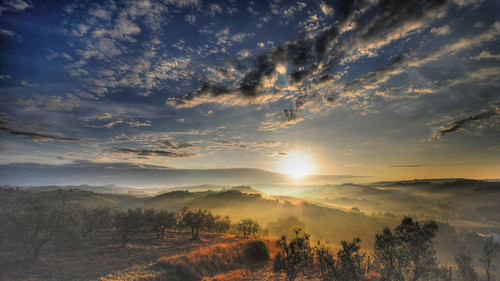[amazon_image id=”0743482832″ link=”true” target=”_blank” size=”medium” class=”alignleft”]The Tempest (Folger Shakespeare Library)[/amazon_image]William Shakespeare’s play [amazon_link id=”0743482832″ target=”_blank” ]The Tempest[/amazon_link], widely believed by scholars to be the last play he wrote alone, is the story of the exiled Duke of Milan, Prospero, who calls forth a storm to shipwreck his brother Antonio, who has usurped his dukedom, and Alonso, King of Naples, who helped Antonio. Following the shipwreck, Alonso and company are separated from Alonso’s son Ferdinand and believe him to be dead. Ferdinand meets Prospero’s daughter Miranda, and the two fall in love at first sight. Prospero is served by two “native” inhabitants on his island—Ariel, a spirit Prospero freed from his imprisonment in a tree by the witch Sycorax, and Caliban, Sycorax’s son. Prospero promises he will free Ariel after he has accomplished his goal of uniting his daughter with Ferdinand and recovering his dukedom.
I first read The Tempest many years ago when I took a Shakespeare course in college. I am not sure I understood it at all, and of all the plays I’ve read by Shakespeare, I think this is definitely one that needs to be seen. I am in the unfortunate position of not being able to do that at the moment. It doesn’t seem as though any version is available on Netflix. The version directed by Julie Taymor won’t be available on DVD until September. I looked around on YouTube, but nothing is jumping out at me. The Julie Taymor film does look good:
Watching it even in clips in the trailer made me realize just how visual the play is, and probably not the best one to try to read rather than see.
I really found myself drawn to Ariel and Calaban, and the movie certainly seems to play up what I thought was interesting about each character. It’s strange how your memory plays tricks on you because I remembered Caliban saying “‘Ban-‘ban-Ca-caliban” over and over, but he only says it once, in a song—and he was drunk at the time. Ariel was interesting in seeing the way to freedom might be cooperation with Prospero; Caliban refused, and his situation is left ambiguous in the end—would he be freed, too? Or left alone on the island? Reading this again was like reading it for the first time, given the time between readings, and I was surprised to find that Prospero kept his word to Ariel. I didn’t expect him to. I know that The Tempest has been subject to colonial interpretation before, but it is an interesting lens through which to view the play.
I reread this play for many reasons. First, I want to read Dexter Palmer’s steampunk novel [amazon_link id=”B0048EL84Q” target=”_blank” ]The Dream of Perpetual Motion[/amazon_link], which is based on The Tempest, and I thought familiarity with the source material would make it more enjoyable. I’m also participating in the Shakespeare Challenge, and I wanted to read a play I didn’t know well. I have taught [amazon_link id=”0743477111″ target=”_blank” ]Romeo and Juliet[/amazon_link] so many times that I can recite large chunks of it. I have also taught [amazon_link id=”1439172250″ target=”_blank” ]Macbeth[/amazon_link], [amazon_link id=”074347712X” target=”_blank” ]Hamlet[/amazon_link], [amazon_link id=”0743482824″ target=”_blank” ]Othello[/amazon_link], [amazon_link id=”0743482840″ target=”_blank” ]Richard III[/amazon_link], [amazon_link id=”074348276X” target=”_blank” ]King Lear[/amazon_link], [amazon_link id=”0743477545″ target=”_blank” ]A Midsummer Night’s Dream[/amazon_link], [amazon_link id=”074347757X” target=”_blank” ]The Taming of the Shrew[/amazon_link], and [amazon_link id=”0743482751″ target=”_blank” ]Much Ado About Nothing[/amazon_link]. The Tempest is one of Shakespeare’s greatest plays that I was almost completely unfamiliar with.
If I had any problems with the play, I think they arose from the visual nature of everything from the magic to the jokes among Trinculo, Stephano, and Caliban. In a novel, an author describes these events for the reader, whereas in a play, the writer assumes the actors will bring it to life, and Shakespeare, more than any other dramatist I have taught, trusted actors and directors and left little behind in the way of stage directions. I’m not a scholar—lack of stage directions may be a convention of Renaissance drama—but it is something I have noted before and discussed with students. Eugene O’Neill, for instance, and Arthur Miller, too, have explicit directions.
As always with Shakespeare, there is a passage or two that take your breath away with their beauty. My favorite (and it’s certainly one of the most famous Shakespearean passages) was this one:
Our revels now are ended. These our actors
As I foretold you, were all spirits and
Are melted into air, into thin air;
And like the baseless fabric of this vision,
The cloud-capped towers, the gorgeous palaces,
The solemn temples, the great globe itself,
Yea, all which it inherit, shall dissolve,
And, like this insubstantial pageant faded,
Leave not a rack behind. We are such stuff
As dreams are made on, and our little life
Is rounded with a sleep.
I know that some scholars believe Shakespeare meant both the earth and the Globe theater in this passage—that it was his goodbye letter to theater. It’s a great metaphor for theater—it is the stuff dreams are made on, in so many senses of the word.
Rating: 



 (I can’t give a Shakespeare play any other rating. It’s antithetical to the English teacher code.)
(I can’t give a Shakespeare play any other rating. It’s antithetical to the English teacher code.)












